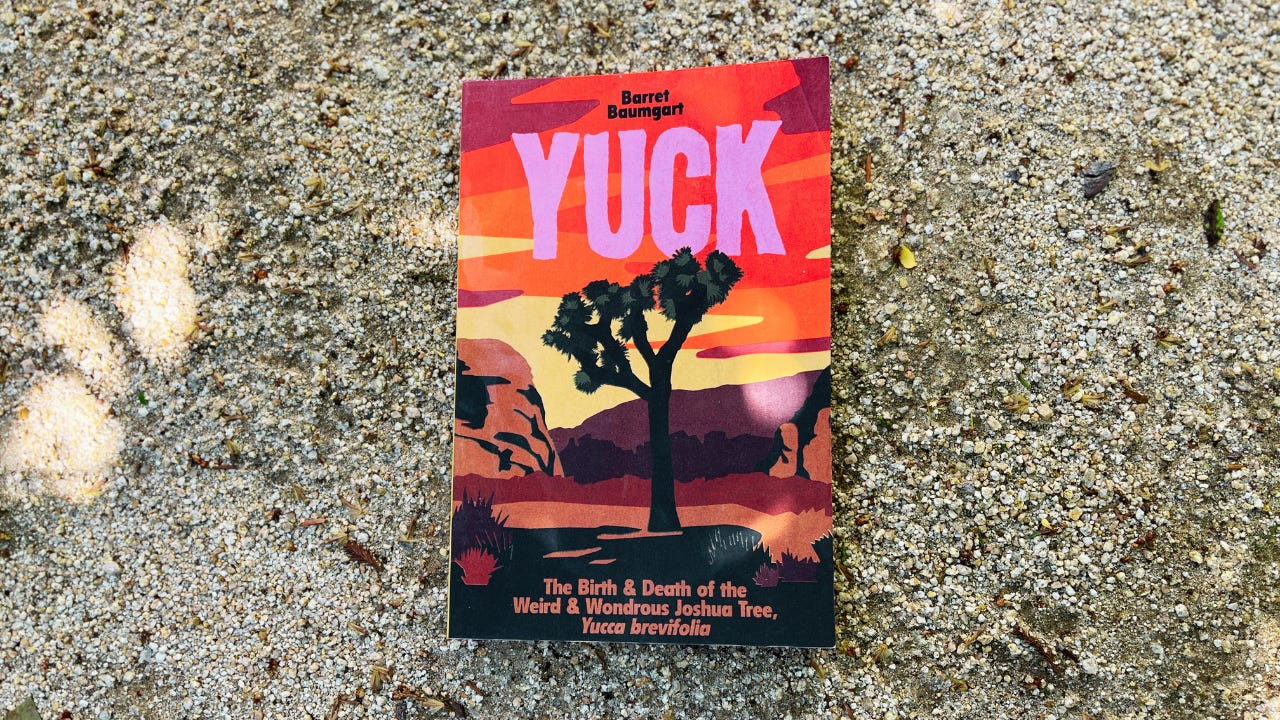Don’t Climb the Joshua Tree
Review of Barret Baumgart’s YUCK: The Birth & Death of the Weird & Wondrous Joshua Tree
by
In the song “Everything Waits to Be Noticed,” Art Garfunkel sings:
Twenty-eight geese in sudden flight
The last star on the edge of the night
A single button come undone
The middle child, the prodigal son
Everything waits to be noticed
While reading Yuck: The Birth & Death of the Weird & Wonderous Joshua Tree by
, this song spontaneously came to mind, even though I haven’t heard it in years. The Joshua Tree, as Baumgart describes it, is one of these secretly profound things: for many long, lonesome years, it waited to be noticed.American pioneers encountered the Joshua Tree (yucca brevifolia) on their way to the California coast, but they didn’t exactly see anything special about it. In fact, they apparently found it utterly grotesque. Baumgart quotes a number of early Californians offering their assessment of the native plant:
They are grim, twisted desert trees—incredibly old; they look like repellant souls in pain.
One can scarcely find a term of ugliness that is not apt for this plant.
At dusk…the twisted freaks of the plant world…stood out in silhouette on the fossil wasteland like some arthritic nightmare.
Worse yet, Joshua trees serve no practical purpose. Efforts to make paper out of the wood failed. Historically, the tree was seen not only a monstrosity, but a useless monstrosity.
This all changed in the past few decades. Joshua Tree National Park was founded in 1994. Since then, its popularity has grown consistently. Today, Baumgart writes, it is “one of America’s most trafficked national parks” with nearly three million annual visitors.
Baumgart quotes GQ’s rave review: “If one small town can embody everything that’s cool, it’s Joshua Tree.”
Previously, it was impossible to get people to stop calling Joshua trees grotesque. Today, it’s impossible to keep the hottest Instagram influencers away from them. And will someone please tell Miley Cyrus they’re too delicate for climbing!
Like the last star on the edge of the night, finally, the yucca brevifolia has been noticed. Just in time for the star to fade…
“It is peculiar,” writes Baumgart, “that this sudden passionate desire to return to the desert and invest attention in the Joshua Tree arrives precisely at the time when the scientific community asserts without ambiguity that the tree is doomed.”
According to current estimates, we have till about 2100 before Joshua tree habitat is entirely erased thanks to climate change.
In this respect, the fact that our culture has noticed the beautify of the Joshua tree is bittersweet. Beyond the reality that the tree might be doomed, Baumgart highlights many uncomfortable details swirling around our love of the desert and the LA basin:
There are the unprecedented throngs of tourists which suffocates the once-treasured sense that Joshua Tree National Park was a hidden secret. There is the nearby Apex Regional Landfill, the largest landfill in the world, reminding us of the wastefulness of our age. There are the displaced Native Americans, who fittingly referred to yucca brevifolia by a word meaning “a bridge.”
Yuck is carefully crafted to encourage readers to notice—and reflect on—these and other specific details. The text of the book is laid out as a kind of sprawling prose poem, with playful indents and line breaks, recurring themes, and carefully planned phrases styled in large, bold font. It’s an engrossing history lesson, an important footnote to the boundless mythology surrounding the greater LA region, and a must-read for anyone planning a trip into the desert beyond Palm Springs and into the land of the Joshua tree.



